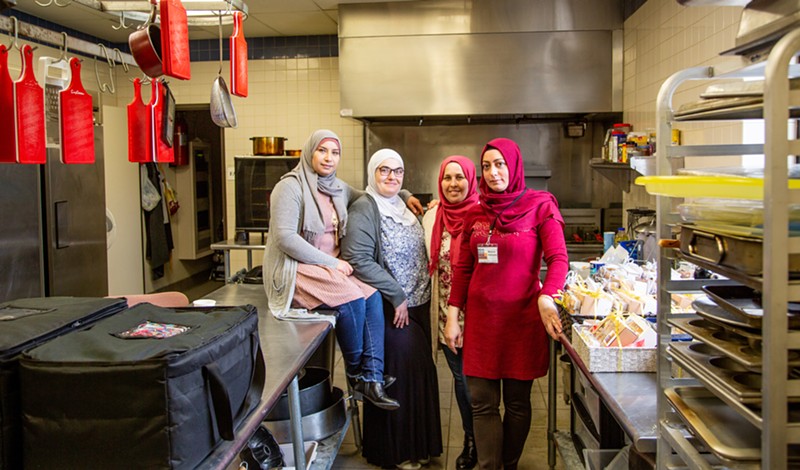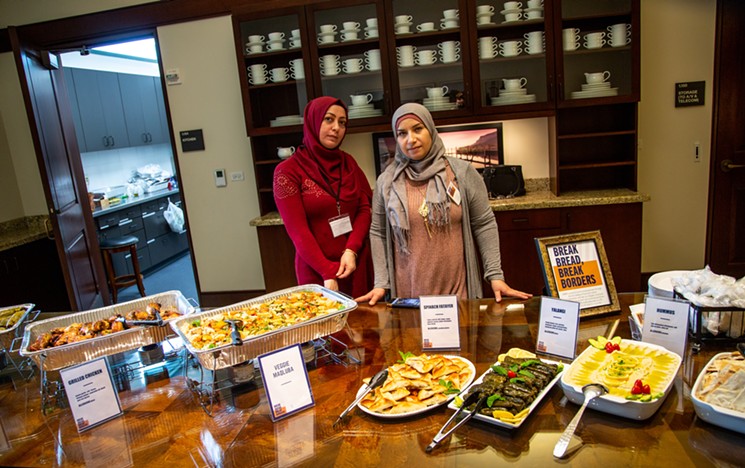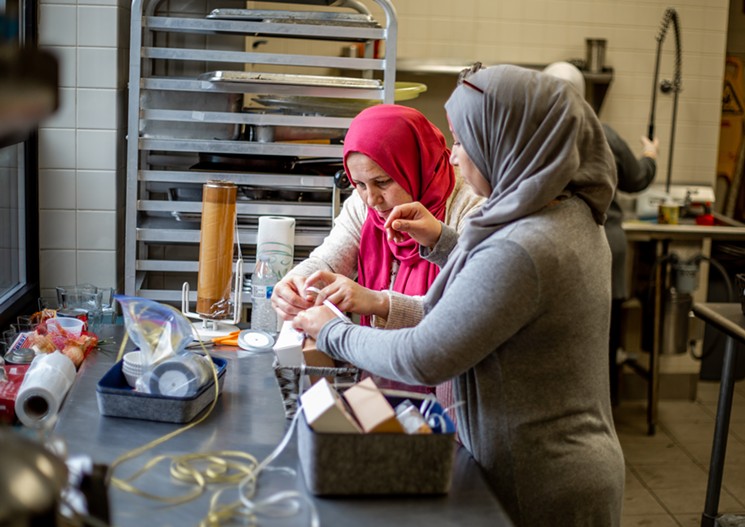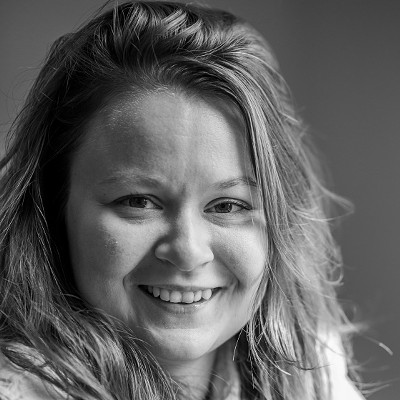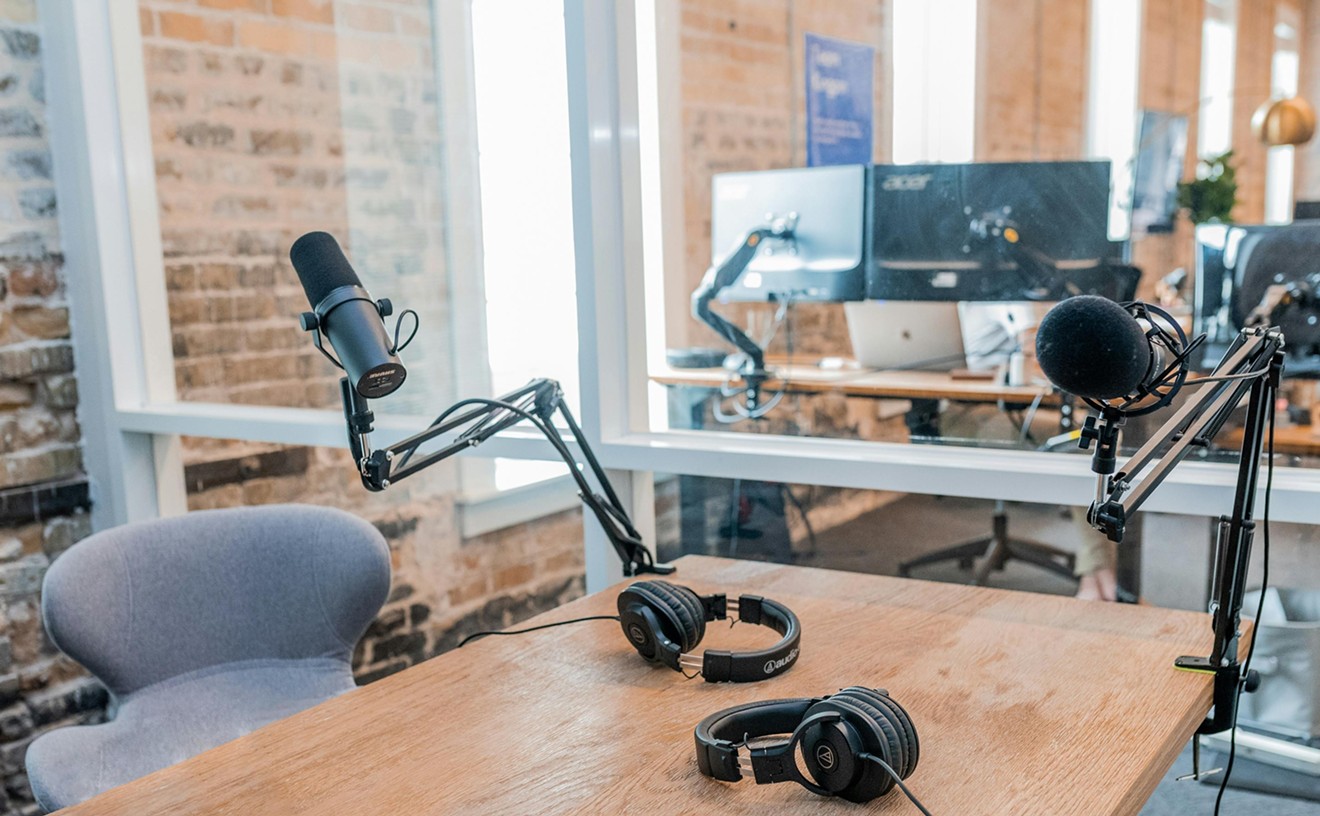Sunlight seeps into the small commercial kitchen in the Muslim American Society's Islamic Center as Maissa Alkhadir stirs a steaming pot of rice and potatoes. Reaching to a shelf above the stove, she grabs a plastic canister of dried spices and sprinkles some into the pot.
Once it's done, she spoons the contents of the pot into a foil serving dish and sprinkles chopped carrots and zucchini on top. The smells of onion and cumin waft through the room.
As she moves about the kitchen, Alkhadir sings a high, lilting tune to herself. When asked what the phrase she's been singing all morning means, she pauses to think for a moment.
"My heart is comfortable for you," she says.
On a stainless steel table under the kitchen window, Rania Alahmad ties gold and silver ribbon around boxes of baked sweets, and Rasha Sultan and Nawarah Shaker load chicken-filled dumplings and stuffed zucchini into foil dishes. The women chat and laugh in Arabic.
All four women are Syrian refugees who fled the war in their home country. Each spent years in temporary housing outside Syria before coming to the United States and eventually finding their way to Break Bread, Break Borders, a refugee-run catering company.
They’re preparing vegetarian maqluba, grilled chicken, spinach fatayer, hummus, kousa mahasi, Chechen dumplings and sweets for an event later that day. The women cook all the food themselves, sharing authentic dishes from their country and families with Dallas.
“The genesis of it all is really my mom was a chef, and I am a descendant of refugees,” said founder Jin-Ya Huang.
Four years ago, Huang lost her mother to cancer. Devastated, she tried to figure out how to grieve and honor her mother’s memory.
The day Huang sat down with the Observer was exactly four years, almost to the minute since her mother died. For many people, that might have made the interview harder. But on a day when others would stay home and avoid the world, Huang chose to share her mother’s story, invoking a concept she learned from a friend. In Mexico, an old adage insists that people really die twice.
“The first time is when your soul leaves your body, your physical body," she said. "The second time is when people stop talking about you. And there’s something to be said for that, you celebrate life."
Her voice quavered just a little as she said it. But she’s made sure that, so far, her mother has only died once. Her memory and her passion for bringing people together over food are alive and well.
In early 2017, Huang organized a community dinner. The idea was to bring community members together to talk about food and to share stories. She went to local immigrant organizations asking for women who liked to cook. She gathered women from Syria, Iraq, Burma and Nepal. Each group had at least one person who spoke English and translated for the others as Huang spoke, but the language barriers made it hard to understand what Huang was after.
Then she showed them a picture of her mother.
“And then everything was clear. That was just like my homage to her, by honoring her legacy and continuing the work that she did when she was alive,” Huang said. “That didn't need any translation whatsoever.”
She invited 80 guests to the dinner. Two women, one from Syria and one from Iraq, cooked in the Café Momentum kitchen. The women ran the kitchen. Later, they shared their stories with the guests.
“I knew we were building something here more than food, more than a company. It was about compassion,” Huang said.
Although the dinner was supposed to be a one-time event, requests and suggestions trickled in for events that needed catering. And the women told Huang that, while the community dinner was beautiful, they really needed jobs.
In response, Huang founded Break Bread, Break Borders as a nonprofit catering company with the refugee women at its core. Just over two years ago, the women catered their first official event. They’ve been going strong ever since.
"We talk like sisters do ... it's this small family," Huang said.
Alkhadir, Alahmad, Sultan and Shaker are four of Break Bread, Break Borders’ current class of cooks. They’re all certified food handlers. Two of the women have their food manager certification, as well. The women often spend a year learning the ropes and another year helping the next group of women figure out the basics of working in a catering company.
None of the women knew each other before they met through the organization, but they work together as though they’ve known each other for years.
Before coming to the United States, Alkadir and Shaker fled to Turkey, where each waited for years for the United Nations to send them to a permanent home. Alahmad and Sultan did the same when each left Syria for Jordan.
When Alahmad decided to leave, it was sudden. She recounted waking up one morning after a particularly bad night of bombing and saying it was time to go. Pregnant and carrying one child on her back and holding another by the hand, she walked seven hours across the border into Jordan with her aging parents and brother. When her mother wore out, her brother knelt on all fours, making a seat for her to rest on.
Shaker, who taught French in Syria, has four children, including a diabetic daughter.
“We came here for good care,” she said.
Sultan’s family has been displaced three times by war, once for each of the past three generations. Her Chechen grandparents fled to Golan Heights, an area internationally recognized as a Syrian territory occupied by Israel, where her father was born. Because of the unrest there, the family moved to Damascus, Syria, where Sultan was born. When the fighting in Damascus got bad, she left for Amman, Jordan. She hopes this will be the last time her family has to move because of war.
Coming to the United States was a dream for Sultan growing up. She loved Jon Bon Jovi and taught herself English by listening to his songs over and over and writing down the lyrics.
At the event space, the women unpack insulated canvas bags, unfold collapsible chafing dishes and place large foil pans on top of them. Meticulously, they line up stuffed grape leaves, drizzle oil and lemon on the hummus, sprinkle on garnishes and set up signs. On a separate counter, they set out carafes of spiced coffee and tea and sweets for dessert. Typed signs next to each dish advertise what it is and what, if any, allergens the food contains.
Huang grew up in Taipei, Taiwan. When she was 13, her father lost his job as a cement plant engineer. Huang is one of six siblings, and her parents needed a way to feed the family.
“So my aunt and uncle called and said, 'We’re starting a Chinese version of McDonald's, in Tulsa, Oklahoma. Would y’all like to come and help?' And my parents said yes,” she said.
Huang’s parents moved to the United States with their four youngest children, including Jin-Ya. The restaurant, called Egg Roll Express, grew to 16 franchises. Eventually, Huang’s parents bought one in Farmers Branch. Huang’s mom filled her kitchen with refugees and immigrants.
Moving to a new country is hard, and there are new cultural customs to learn and a new language to perfect. Huang’s mother believed that, like her, these immigrants just needed someone to believe in them. With the boost of a first job in her kitchen, they could go on to better jobs elsewhere.
Many of Huang’s memories of her mother involve food: running the restaurant kitchen, cooking Chinese New Year meals for her dad and shopping for food at the wet market. Here, mother haggled masterfully, seamlessly switching between negotiating and casual chitchat.
“She would do little things like, ‘That fish, you know, look at those eyes, it doesn't look so fresh. I'll pay you this much for however many of them. By the way, how’s your daughter doing? I heard that she did the entrance exam and really well and congratulations!’” Huang recounted her mother switching from one topic to another without a pause. “And then it's like, ‘How about, you know, this fish.’”
Huang’s mother understood how food nourishes much more than the stomach. Huang uses food to give refugee women confidence, to help them practice English and to build work experience.
Many refugees take seven years to adjust to life in a new country, Huang said. But through their work with Break Bread, Break Borders, the women acclimate much faster. But, Huang said, she’s adamant that with the food they cook, the women remain true to their cultures and do not compromise tradition or flavor.
And that’s just the way her mom taught her to be. At the restaurant, whenever it came time to cook traditional Chinese dishes, she slowed the process down to get it just right. Her mom remembered customers' names and who liked what dishes and made them hot, forging a connection with people some of whom Huang still talks to today.
Building that kind of community for refugees through Break Bread, Break Borders is a calling for her.
“I felt compelled … the moment that you feel that you’re so driven that it’s all you want to do. And that was the thing,” Huang said.
For operations director Brian Wilson, pro bono work with the organization is a different kind of calling. Wilson spent 15 years working in U.S. military counterintelligence operations in the Middle East.
“They’re here because of me — I destabilized their country,” he said. “It’s my way to go 'fuck you' to the government … 'If you’re not going to go do anything, I will.'”
Wilson describes himself as “terribly non-emotional,” except when it comes to immigrants and refugees. Then he turns into a big softy.
The women stay with the organization for roughly two years, during which time they learn, teach each other and come up with a plan for what’s next. Huang encourages them to start their own businesses. And those don’t have to be culinary in nature. Cooking with Break Bread, Break Borders is about building a skill set that can translate to many different professions.
“It’s getting that first shot. And everybody deserves that first shot and having people believe in them,” Huang said.
Already, on the side, Alhamad has her own catering company. In the kitchen at the Islamic center, the operations permit is in Alhamad’s name. But she’s not stopping there. She hopes to have her own restaurant or food cart one day. And that first step that Huang has given her has given her the confidence to reach that goal.
“They always told us, ‘You can do it,’” Alhamad said.
Cooking the food and attending the events not only give the women concrete skills, but it connects them to people too. Talking to a group of Dallas nonprofit employees for whom they catered lunch, Alkhadir told them how afraid she was to come to the United States. But now that she’s here, it looks different.
“It looks like a bridge or a way to see people and to tell them about us,” she said. “And you will find the love in our food.”
[
{
"name": "Air - MediumRectangle - Inline Content - Mobile Display Size",
"component": "18855504",
"insertPoint": "2",
"requiredCountToDisplay": "2",
"watchElement": ".fdn-content-body",
"astAdList": [
{
"adType": "rectangle",
"displayTargets": "mobile"
}
]
},{
"name": "Editor Picks",
"component": "17105533",
"insertPoint": "4",
"requiredCountToDisplay": "1",
"watchElement": ".fdn-content-body",
"astAdList": [
{
"adType": "rectangle",
"displayTargets": "desktop|tablet"
},{
"adType": "rectangle",
"displayTargets": "desktop|tablet|mobile"
}
]
},{
"name": "Inline Links",
"component": "18349797",
"insertPoint": "8th",
"startingPoint": 8,
"requiredCountToDisplay": "7",
"maxInsertions": 25
},{
"name": "Air - MediumRectangle - Combo - Inline Content",
"component": "17105532",
"insertPoint": "8th",
"startingPoint": 8,
"requiredCountToDisplay": "7",
"maxInsertions": 25,
"watchElement": ".fdn-content-body",
"astAdList": [
{
"adType": "rectangle",
"displayTargets": "desktop|tablet"
},{
"adType": "rectangle",
"displayTargets": "desktop|tablet|mobile"
}
]
},{
"name": "Inline Links",
"component": "18349797",
"insertPoint": "8th",
"startingPoint": 12,
"requiredCountToDisplay": "11",
"maxInsertions": 25
},{
"name": "Air - Leaderboard Tower - Combo - Inline Content",
"component": "17105535",
"insertPoint": "8th",
"startingPoint": 12,
"requiredCountToDisplay": "11",
"maxInsertions": 25,
"watchElement": ".fdn-content-body",
"astAdList": [
{
"adType": "leaderboardInlineContent",
"displayTargets": "desktop|tablet"
},{
"adType": "tower",
"displayTargets": "mobile"
}
]
}
]

